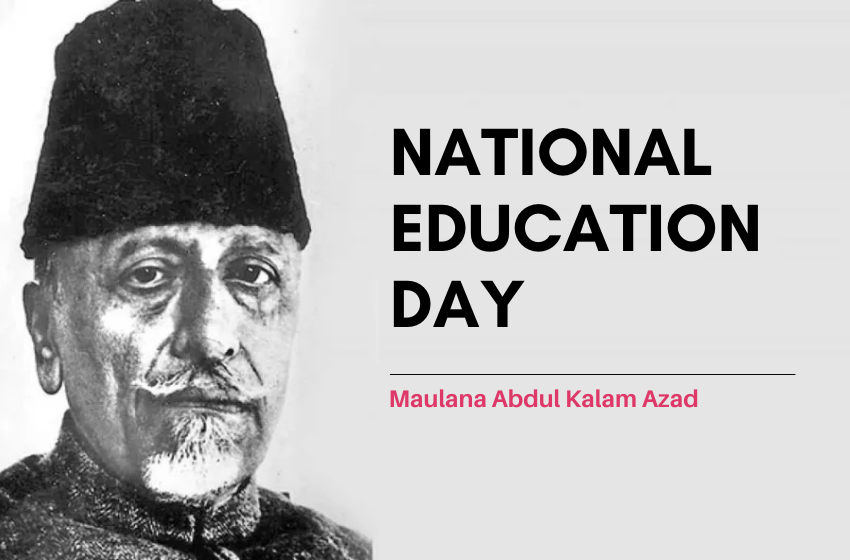The National Education Day is an homage to Maulana Abdul Kalam Azad, a great freedom fighter and an advocate of education. The National Education Day reminds us that as Indians we should honor the legacy of Kalam and remember how much he emphasized and contributed to the field of education, before and after he became the first education Minister of independent India.
“Education imparted by heart can bring revolution in the society”- Maulana Abdul Kalam Azad
He established many educational institutions after independence. Some of the educational institutions/ Universities he established have become a source of pride for India.
Maulana Abdul Kalam ‘Azad’ – The harbinger of Indian Education
“Educationists should build the capacities of the spirit of inquiry, creativity, entrepreneurial and moral leadership among students and become their role model.” – Maulana Abdul Kalam Azad
Maulana Abdul Kalam Azad hoped for India to strive for quality education and that as a nation, it should never compromise on the educational front.
Maulana Abdul Kalam Azad was moved to India at a very young age. He was home-schooled by his father to receive traditional education at home. Azad was very interested in learning and knew many languages like Persian, Urdu, and English.
An Educationist, journalist, freedom fighter, and politician, Maulana Abdul Kalam Azad paved the way for nationalistic Ideas while advocating the importance of Education. After he became the First Education Minister he established many prestigious universities and institutions which are striving for excellence to date.
Maulana Abdul Kalam Azad was a ferocious journalist; he used to publish Al-Hilal, a Weekly Publication, where he exposed the actions of The British. He also became the Youngest Party leader of Congress at the age of 35.
Maulana Abdul Kalam Azad was inspired by Mahatma Gandhi. He took the lead in the Non-Khilafat movement and raised his voice against the actions of the British Government regarding the bad treatment of the Ottoman Sultan. Soon he was arrested for his activities against British Government and was sentenced to prison imprisonment of four years.
But nothing could stop the zeal of Maulana Abdul Kalam Azad to advocate the importance of education, He proved himself right as the institutions established by him manufactures’ the most talented youth of our country.
National Education Day: History
The National Education Day was announced on 11th November 2008 by the Ministry of Human Resource Development (Now renamed as Ministry of Education) to commemorate the Birth Anniversary of The first Education Minister of independent India, Maulana Abdul Kalam Azad, also remembered as Maulana Azad.
The First National Education Day was inaugurated by the then President Pratibha Patil. It is a day celebrated to pay tribute to the man who built the foundation of quality and scientific education in India.
National Education Day: Significance
“We must not for a moment forget, it is a birthright of every individual to receive at least the basic education without which he cannot fully discharge his duties as a citizen.”- Maulana Abdul Kalam Azad.
On The National Education day, every year schools conduct various educational activities which encourage the spirit of the younger generation of our country. The national education day is a way to motivate the young generation to strive for excellence in the field of science and education.
National education Day not only inspires Students but also the educationists, Teachers, and Leaders across the nation. This day holds significance in the terms of our goal to provide education to all sections of the society without any age or class discrimination.
It is a reminder for all the education activists to keep working towards the awareness drive on the importance of education.
It is also a realization of the value of education and a reminder for us to remember and practice the values of Maulana Abdul Kalam Azad. The national education day is to remember his continuous efforts to provide India with quality education.
National Education Day is the way to keep the ideologies and beliefs of Maulana Abdul Kalam Azad alive. As he was the main visionary and chief architect who guided the Indian education system in the right direction and built India stronger with the help of education.
National Education Day: Facts
The main facts about National Education Day are:
- It was first celebrated on 11th November 2008 on the Birth Anniversary of Maulana Abdul Kalam Azad.
- National Education Day was inaugurated by the first woman President of India, Pratibha Patil.
- The inauguration ceremony took place at the Vigyan Bhawan, New Delhi.
- National Education Day is celebrated Nationwide.
- There is no Holiday on National Education Day.
- Many educational activities like essay-writing, symposia, rallies are organized on this Day.
- It also focuses on the awareness drive on education and its importance.
National Education Day: FAQs
Q1. Who was Maulana Abdul Kalam Azad?
Ans Maulana Abdul Kalam Azad was a freedom fighter, an advocate of Quality Education in India, a fearless journalist, and a charismatic politician, who paved the way for the common Indians to get quality education.
Q2. When was the first National Education Day celebrated?
Ans The first National Education Day was celebrated on 14th November 2008, the birth anniversary of Maulana Abdul Kalam Azad to commemorate the efforts of Maulana Abdul Kalam Azad in the field of Education.
Q3.Who decided to celebrate National Education Day?
Ans Ministry of Human Resource and Development announced for the first time, National Education Day on the Birth Anniversary of Maulana Abdul Kalam Azad.
Q4. Who was the first Education Minister of India?
Ans Maulana Abdul Kalam Azad is also known as Maulana Azad was the first Education Minister of Free India. He was the pioneer in the education field of India. He advocated education for all without any reservation. He advocated education for all without any reservation.

